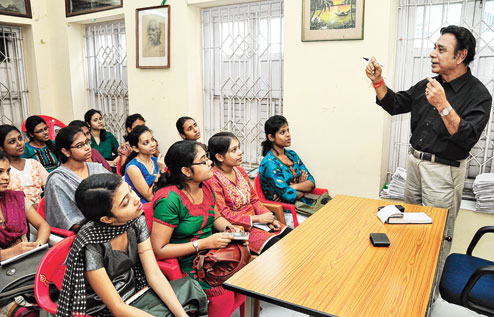 |
| Parimal Chandra Das, the joint convener of Udayan Care’s Bengal chapter, holds a workshop on “aptitude and attitude” for a batch of Shalinis. Picture by Arnab Mondal |
“When I was born, my father filed for divorce because he didn’t want a girl. I couldn’t go to a government school because the form required a father’s signature but he wouldn’t come and sign. My mesho (uncle) helped Ma admit me to a private school and I got through Jadavpur University for my BA. But how could I ask my uncle to fund me again? I had resigned myself to giving up the JU seat when the Udayan Shalini Fellowship happened.”
Today, this young lady with a sweet smile is studying hard and says she won’t stop till she’s clinched a doctorate. At least.
Sitting beside her, another girl shared her story. “I didn’t do too well in Madhyamik and my parents said ‘Enough of studying, get married.’ I coaxed them into allowing me to complete Class XII. And now, thanks to the Udayan Shalini Fellowship, I have completed not just my BA but also my MA. Now my parents tell everyone how I funded my own studies. They are proud of me. That feels good.”
Sitting in a cosy room off Golpark, a bunch of 20 young girls spoke bravely, some with voices choked with emotion, some in halting English, but each with her head held high and eyes shining bright. They are Shalinis, or fellows being funded by Udayan Care.
The organisation supports the education of “needy but deserving girls” from Class XI to the completion of master’s and in exceptional cases, further on. “The maximum number of girls drop out of school beyond Class X because of poor performance, lack of guidance and parental pressure to earn a living or get married,” said Parimal Chandra Das, the joint convener of Udayan Care’s Bengal chapter.
Started in Delhi in 2002, the organisation has today spread to Haryana, Uttarakhand, Maharashtra and Bengal, with the Shalini fellowship covering the education of over 1,500 girls.
But being a Shalini is not just about getting financial help, pointed out Kusum Bhandari, the convener of the Bengal chapter. “It’s about total development. Apart from selecting and funding bright young girls, we mentor them, teach them life skills and monitor their progress on a quarterly basis,” said Bhandari.
The girls are selected on the basis of NAT — need, aptitude and talent. Applications are invited from students of government schools and colleges who have scored a minimum 60 per cent in the boards. After a written test, they are called for an interview, along with their parents or guardians.
Once selected, each girl is assigned a mentor, who tracks her monthly progress. The mentors can be anyone, from educationists and office-goers to homemakers and older students. “The Shalinis are often first-generation learners and they cannot discuss their problems with their parents. They often connect more with their mentors,” said Bhandari.
“Apart from the funds, I needed a lot of mental support to continue pursuing my dreams. It really helps to know that I can turn to my Mentor Didi at any point,” smiled Sharmila Chakraborty, a Shalini pursuing BA in Bengali.
A unique aspect of the Shalini fellowship is grooming and personality development. Right from helping them broaden their horizons to teaching them how to colour co-ordinate their outfits, the sessions and workshops make confident ladies out of these young girls. Stress is laid on developing spoken English and public-speaking skills, computer awareness, general knowledge and newspaper reading.
“Many educators, visiting professionals and industry leaders come and speak to our girls. When our sponsors Harsh Neotia and Suresh Neotia addressed the girls I could see how awed and inspired they were!” said Das.
The result? Earlier, when asked about their ambition, nine out of 10 girls would reply “school teacher”. That’s all they knew. Today, they want to be everything, from teachers and professors to doctors, IT brainiacs and scientists. And they do realise their dreams.
In the recent past, Shalinis have been placed in Bhabha Atomic Research Centre, Cognizant, Genpact, BPL, Balaji Telefilms and West Bengal Armed Police, while others are pursuing higher studies at IIT Kanpur, IIT Mumbai and other leading institutes.
On November 18, Udayan Care will hold its sixth induction-cum-oath-taking ceremony at GD Birla Sabhagar, where governor M.K. Narayan will be the chief guest and MP Saugata Roy the guest of honour. It’ll be an occasion when 223 girls will become indomitable Shalinis.
As Kusum Bhandari put it, “I firmly believe that when you educate a woman, you educate a family and eventually a whole nation.”









